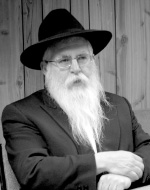Yaakov Avinu did not pass away; he faded, as one who went into a faint. * Source materials compiled by Rabbi Shloma Majeski. Translations are in bold. Underlining is the emphasis of the compiler.
Translated and presented by Boruch Merkur
 Chapter Two of Likkutei Mekoros focuses on the concept of eternal life, beginning with a letter of the Rebbe on the eternal soul, an aspect of eternality that is universal to all Jews. Next, it was pointed out how specifically tzaddikim are said to be alive even posthumously. The Alter Rebbe in Tanya provides insight into the special status of tzaddikim, saying that they live on even in the physical realm, after their histalkus. The reason for their special status is their heightened spirituality, their life being spiritual life, not material life.
Chapter Two of Likkutei Mekoros focuses on the concept of eternal life, beginning with a letter of the Rebbe on the eternal soul, an aspect of eternality that is universal to all Jews. Next, it was pointed out how specifically tzaddikim are said to be alive even posthumously. The Alter Rebbe in Tanya provides insight into the special status of tzaddikim, saying that they live on even in the physical realm, after their histalkus. The reason for their special status is their heightened spirituality, their life being spiritual life, not material life.
The final section of Chapter 2 focuses on how certain individual tzaddikim are singled out for living on after their histalkus. This week we begin with the Gemara’s statement, “Yaakov Avinu los meis – Yaakov Avinu did not die.”
Rav Nachman and Rav Yitzchok were dining together. Rav Nachman said to Rav Yitzchok: Master, speak some words of Torah. Rav Yitzchok answered: Thus said Rebbi Yochanan: One may not speak during a meal, lest it result in the danger of the windpipe preceding the esophagus [causing choking].
Following the meal, Rav Yitzchok continued: Thus said Rebbi Yochanan: Yaakov Avinu did not die. (Rather, he lives forever ––Rashi.)
Rav Nachman asked: Was it in vain then that they eulogized, embalmed, and buried him? (For indeed the Torah says about Yaakov that “they embalmed (him) and eulogized (him)” ––Rashi.)
Rav Yitzchok replied: I derive this teaching from Scripture (and regarding the fact that “they embalmed” him – they were under the impression that he had died ––Rashi), as it is said, “‘Do not fear, My servant Yaakov,’ says G-d, ‘do not be frightened, Yisroel, for behold I am saving you from afar, and [redeeming] your descendants from the land of their captivity’”(Yirmiya 30:10). Here the Torah juxtaposes Yaakov to his descendants, teaching that just as his descendants are alive, so is he alive.
(His descendants are alive: When G-d gathers the Jewish people “from the land of their captivity,” He gathers the living, for it is they who are in captivity, whereas the dead are not said to be captives. So is he alive: For Yaakov will be brought to the Diaspora in order that his children will be redeemed before his eyes, as we find regarding [the exodus from] Egypt: “And Yisroel saw, etc.” The Sages teach that this verse refers to Yisroel Saba, Yisroel the Elder. And regarding the fact that “they embalmed” him – it appeared to them that he had died, but he was actually alive ––Rashi.)
Anaf Yosef, a commentary in Ein Yaakov, writes at length on this passage, elucidating it in spiritual terms.
“Yaakov Avinu did not die”: The following is the meaning of this statement. When he is called Yisroel, then his Ruach and Neshama gain a precious G-dly illumination, extremely exalted and elevated, far beyond what shone upon him prior to that. Death is the departure of the Nefesh from the body. Now, this great [revelation] that enhances his Nefesh, Ruach, and Neshama when he is called Yisroel is what was nistalek from him [upon his passing]. In this respect, the term “death” does apply, for this aspect died and departed from him entirely. In fact, every instance where it mentions death [in his regard], it is in reference to the name Yisroel: “And Yisroel said [upon seeing Yosef]: Now I may die”; “And Yisroel said to Yosef: Behold I am dying”; “And Yisroel’s days approached death.”
Yaakov, however, maintained his original status. He was not nistalek, he did not pass away; he faded, as one who went into a faint, whose powers of Nefesh, Ruach, and Neshama still cleave to him. Thus, with respect to Yaakov it only says that “he faded and was gathered,” whereas it says of Yitzchok that “he faded and died and was gathered, etc.”
To that extent, Rebbi Yochanan’s statement, “Yaakov Avinu did not die,” is precise, for it refers to the aspect of Yaakov at the time when he was “Avinu – our Father,” siring his children, which took place prior to his being called Yisroel. Indeed, all of that life-force [associated with Yaakov] remained embedded within his flesh.
Other tzaddikim, to be sure, are called “those who rest in the dust,” [resting but] not actually dead. Indeed, “Rabbeinu HaKadosh […] would make Kiddush [posthumously] in his home every Shabbos night, Rebbi Elazar bar Shimon judged the Jewish people for twenty-two years from his room after his histalkus, and Rebbi Achai bar Yoshiya spoke with Rav Nachman from his grave. These tzaddikim, however, only had some life-force from their Nefesh, but not from their Ruach or Neshama. Those dimensions of the soul departed from them [when they passed on]. Yaakov, however, was different, for all of these dimensions of his soul remained in him, as discussed above. (Alshich on Parshas VaYechi)